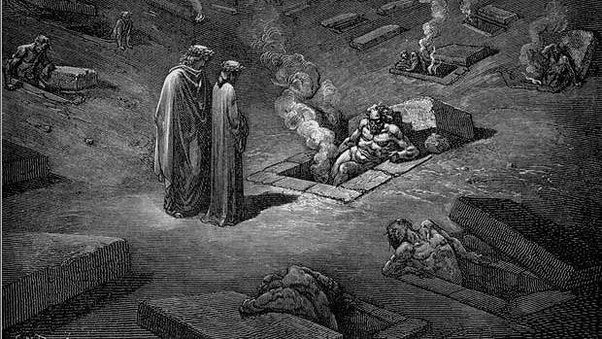“This isn’t dogma, just my thought,” said Pope Francis recently on an Italian talk show. “I like to think of Hell as being empty. I hope it is.”
Once again the pontiff, in an office that Catholics used to claim assured the clarity of doctrine, stirred up controversy and confusion.
The pope was responding to a question about how he “imagines Hell.” As Eric Sammons, the editor of the conservative Catholic Crisis Magazine, said, the pope was not necessarily being unorthodox. We can imagine all kinds of things. He went further in expressing his desire. He “hopes” that Hell is empty. The Catholic catechism, citing 1 Timothy 2:4, says that “In hope, the Church prays for ‘all men to be saved’” (CCC 1821).
But Sammons says that the catechism and the words of Jesus also indicate that people have gone and continue to go there. He argues that “Pope Francis’s hope that Hell is empty is not harmless wishful thinking. It leads people away from a serious practice of the faith, and it leads them away from bringing others to a serious practice of the faith.” He concludes, “Ironically, a hope that Hell is empty will do much to help fill it up.”
But the pope is not the only one to minimize the doctrine of Hell. A number of evangelicals have rejected the doctrine of Hell in favor of either annihilationism, in which God’s judgment simply annihilates the lost, or universalism, in which everyone is saved. The prominent Christian thinker David Bentley Hart, a convert to eastern Orthodoxy, insists that universalism is the only valid Christian teaching, as he expresses in his book That All Shall Be Saved. And, to be honest, we hardly ever hear about Hell anymore even in very conservative churches, even when those churches formally confess that Hell is real.
Certainly, the prospect of eternal punishment is horrible to contemplate. Dante helped me to understand the concept. The punishments he dramatizes in the Inferno are the sins themselves. The wrathful attack and tear each other in a river of blood, just as they did on earth. Those who reject love completely by betraying those who did good to them exist forever in the isolation they have chosen, their cold hearts frozen in a lake of ice. The recently-died sinners in the Inferno are eager to find their place of punishment, rushing to it as they rushed to their sin. In rejecting God, they reject everything that is good, including their very humanness, and, in a sense, become their sin. (Dorothy L. Sayers has written an excellent guide to this reading of the Inferno and the entire Divine Comedy in the notes to her translation and in her book Introductory Papers to Dante.)
The controversy, though, about whether a just and loving God would ever punish anyone eternally reminds me of something J. G. Hamann said in his notes on the Book of Job in the London Writings:*
The speeches of the three friends teach us how insufficient faith, or the knowledge of God’s name, is that is based on His general attributes. Yes, they teach us how we can misuse them so badly through their improper application in particular cases, and how, instead of justifying God’s wisdom and holiness, we can deny them. (Job 9 April 1758, “Biblical Meditations,” London Writings, p. 152).
For Hamann, trying to approach or understand God from His “general attributes” risks turning God into an abstraction, rather than an actual person. Yes, God is righteous, just, loving, omnipotent, omniscient, etc., but we know those attributes from His revelation of Himself in His Word. Job’s “comforters” were playing off God’s attributes against each other, reasoning that since God is just, Job must deserve his suffering.
We do the same when we play off God’s attributes against each other in trying to unravel the “problem of suffering.” If God is both righteous and omnipotent, He would eliminate suffering. Therefore, He is either not righteous, not omnipotent, or He does not exist! But, rejoins Hamann, we cannot know God sheerly by reasoning from His attributes. He is a real Person, not a puzzle, nor an idea, nor a collection of qualities for us to harmonize. Righteousness does describe Him, but we may not be able to fathom the fullness of what that means as it pertains to the Holy One of Israel as revealed in His Word. It is evidently a righteousness that allows for human suffering, as the Book of Job shows and as human experience confirms.
In the rest of this passage, Hamann says that God’s rebuke of Job’s friends demonstrates that “human compassion for the weakness and suffering of our neighbor is more acceptable to God than the justification of His ways.” The friends try to rationalize and justify God’s actions, whereas God doesn’t care about any of that. He just wants the friends to show compassion for Job’s weakness and suffering!)
As it relates to the question of Hell, many of the arguments against it take the form of what God “would” or “would not” do. God has the attributes of justice and mercy; therefore, He “would not” consign anyone to Hell.
But it is futile for us mere mortals to speculate what God “would” or “would not” do. We cannot know that, apart from what God reveals to us in His Word, where we find lots of things that baffle our understanding.
The question is whether or not Hell exists (and is populated), and, more importantly for us, how to avoid going there. God’s Word tells us–to our horror–that it does (e.g., Matthew 5:22-30; 10:28; 25:41, etc.). But it goes on to tell us how God Himself bore our sins and took our punishment to prevent us from going to Hell.
So if Christ died for all, why would anyone have to go there? Why would God make it so that we have to be “in Christ” by faith to receive this benefit? If God extends His grace to all of those sinners who have faith in Him, He would surely extend that grace to everybody, whether they have faith in Him or not. Well, there we go again, trying to figure out God and, in fact, constrain Him so that He does what we would like Him to do, by playing around with His attributes. As opposed to believing His Word.
What we need to know about Hell is that “There is therefore now no condemnation for those who are in Christ Jesus” (Romans 8:1).
*Ballast Press has sold Hamann’s London Writings, translated by John W. Kleinig and edited by yours truly, to Lexham Press, which will be coming out with its edition in the days ahead. So though the Ballast Press version is still listed at Amazon, it is no longer available from that publisher. The Kindle version, which I linked to above, may still be available.
Illustration: The Sixth Circle: The Heretics (Cantos IX-X) by Gustav Doré, Illustrations of Dante (1861) via Wikipedia, Public Domain, https://commons.wikimedia.org/w/index.php?curid=73412462














